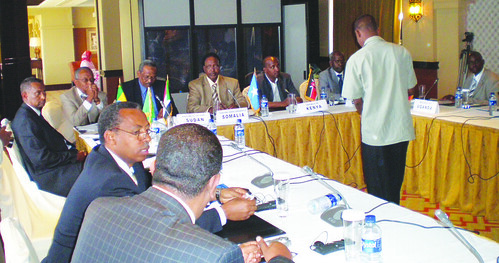Operational since 2006, the Livestock Policy Initiativ
 e (LPI) is implemented by the Intergovernmental Authority on Development (IGAD) through FAO with the financial support of the European Commission. IGAD member states comprise of Djibouti, Eritrea, Ethiopia, Kenya, Somalia, the Sudan and Uganda.
e (LPI) is implemented by the Intergovernmental Authority on Development (IGAD) through FAO with the financial support of the European Commission. IGAD member states comprise of Djibouti, Eritrea, Ethiopia, Kenya, Somalia, the Sudan and Uganda.IGAD decided to set up the LPI initiative having observed that, despite its fundamental importance to poverty reduction, livestock’s unique potential is not fully exploited. The IGAD LPI’s purpose is to strengthen the capacity of IGAD member states and other stakeholders to formulate and implement livestock and livestock related policies that sustainably reduce food insecurity and poverty. This means raising capacities to do things differently, in terms of making the policy process inclusive of the poor, evidence-based and livelihoods focused.
To achieve this, multidisciplinary policy fora and working groups established in each of the IGAD countries to ensure the participation of diverse stakeholders, which are drawn from professional and grassroots, civil society and community-based organisations. The Policy Fora mainly work on two areas: at the national level, on Livestock and Poverty Reduction Strategy Papers and National Development Plans; at the regional level, on the Regional Policy Framework on Animal Health in the Context of Trade and Vulnerability.
Since its start, IGAD LPI has given attention to knowledge sharing policies as confirmed by Dil Peeling, its Chief Technical Adviser. The Initiative, in fact, facilitates livestock information management in all IGAD member states by putting in place systems for livestock policy information analysis, decision-support and monitoring of policy change through its information and data portal.
The IGAD Livestock Information Portal was put into operation in 2009 to assist the collection, analysis and documentation of livestock related-data information. IGAD LPI is currently engaged in increasing the information access and the knowledge base in the livestock sector through the studies, spatial data, links to other information sources and collection of documents; as well as through the strengthening of the knowledge management and decision support system. The portals are managed at the national level by coordinators, who also sit on the policy fora. It is their responsibility to facilitate balanced debate by anticipating information needs. After each meeting, participants are invited to evaluate themselves on how well they used information in drawing their conclusions. The intention is therefore not only to provide information, but to develop a culture of information use in the elaboration of policy.
At the Fair, after visiting the different booths, Dr. Dil Peeling told us how knowledge sharing is at the heart of several of IGAD LPI’s achievements. As he underlined in his interview with us, to know about the needs of the people we should talk to the people, a trend yet not always adopted by those who work for development.
The Share Fair in Addis has been a beneficial setting to present and promote the Initiative, as mentioned by Abebe Demissie, Communications Officer for IGAD LPI. Abebe attended several courses on knowledge sharing tools at the Fair, and shared his impressions about the event through this short interview. According to Abebe blogs and wikis are useful not only to disseminate information from researchers and policy makers to different stakeholders, but also to receive feedbacks.
---
Post written by FAO's Knowledge Sharing Team members Elena Di Paola and Gauri Salokhe.

No comments:
Post a Comment